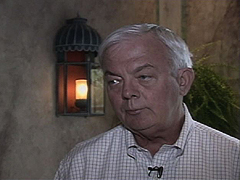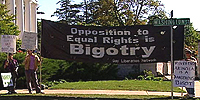In This Episode << SLIDE LEFT TO SEE ADDITIONAL SEGMENTS
Bishop Peter Lee
Read more of Kim Lawton’s interview in New Orleans with Bishop Peter Lee of the Episcopal Diocese of Virginia:
Q: How would you characterize your conversations with the Archbishop of Canterbury and the other bishops?
A: I think the conversations between Archbishop Rowan and the American bishops were helpful and honest. I think it gave us an opportunity to let him see more of who we are as bishops in a very different context than where he usually works, and it gave us an opportunity to hear some of his concerns from his perspective, looking at the whole worldwide communion.
 Q: Do you think the meeting will help ease some of the tensions?
Q: Do you think the meeting will help ease some of the tensions?
A: I think so, I think so, especially among the people who are under the radar, so to speak, or the representatives of the Anglican Communion that were here. Some of them were here, and they were here for the whole meeting, so I think that will help a lot, because they gained firsthand experience with the American church.
Q: What was the main message? Was there one message or were there a lot of messages that the American bishops communicated to the archbishop?
A: I think there were a number of different messages, but the main ones, it seemed to me: Number one, the American church values the worldwide Anglican Communion and wants very much to stay in relationship with the communion. Second, we operate in a different cultural context, and we don’t want that context to move backwards in terms of the welcome we give to gay and lesbian people in our own church.
Q: And how does that get resolved, given the situation or position of some in the church?
A: I think it’s resolved by patience and time, that as people — I know anecdotally of African clergy who have been guests at American churches where one of the clergy, say, in a multi-staff church was gay and had adopted children, and it was a brand new experience for the African priest to experience that reality, and so getting to know people like that on a personal level has been very helpful.
Q: There’s been a lot of hoopla leading up to this meeting, saying this is a make or break time for the communion, that the ultimate relationship between the Episcopal Church and the worldwide communion could be at stake. How do you assess where the relationship is?
A: I don’t see this as a deadline or breakthrough meeting. It’s an important meeting, but it seems to me that the relationships that we have worldwide, with dozens, hundreds of Anglicans worldwide are going to be intact. A very important meeting prior to this one occurred in July ’07 outside of Madrid, where a group of about 25 American bishops, including me, met with about 30 African bishops, and the press was not invited, and it was very clear that the great majority of them wanted to continue in relationship. The Anglican Communion is not a juridical group where there is a clear method of kicking someone out, to put it bluntly. So if we are — if our relationship is stressed with the rest of the communion to the breaking point, the break will come from others, not from us.
Q: I understand that there has been a lot of conversation here about the role of authority and how different regions or different churches within the communion are organized. Is that a big issue?
A: That is a big issue, I think. The Episcopal Church of the United States has a major role for bishops, elected lay people, and elected other clergy in addition to bishops in our governance at every level of the church, and that’s not true of some other provinces in the communion where bishops have an almost monarchical authority in some places. I think for others around the world to understand that about us has been very important, and it’s important for us to understand where they’re coming from as well.
Q: Is there a concern that perhaps some of the other leaders in the communion are trying to take on too much power, more power than their particular roles might have?
A: I think there is a concern among the American bishops that the primates, the archbishops, when they meet together, they are the newest group internationally of the four instruments of union — the Archbishop of Canterbury, the Lambeth Conference, the Anglican Consultative Council, and the primates. The primates are the newest group. They were only formed in the 1970s, and our experience, especially in view of the communiqué that they prepared in February of 2007, our experience has been that they seem to be exceeding the authority that we usually grant to such international bodies.
Q: How big of a point of contention is having US priests becoming bishops under the auspices of bishops in other parts of the world?
A: I think it’s discouraging and confusing. I have two such bishops now in my geographical diocese. Both were formerly priests of my diocese; they are both friends of mine. But I think their consecration as bishop is very confusing for the people that they’re supposed to serve, and it does not help in trying to work out these differences in a long-term way.
Q: What about the situation over property? Are those lawsuits still going to go forward? The archbishop did mention that he is disappointed to see lawsuits happening.
A: Well, I’m very disappointed to see lawsuits happening. The churches that voted to leave our diocese, the next day after their vote they went to court, asking the courts to declare that the property belonged to them, so our response in the courts is a defensive measure. We didn’t start that. We feel, though, that we have an obligation, to the people of the past who built those churches and to the people of the future who expect to have an Episcopal church in their community, to see that those churches belong to the Episcopal Church, so those legal proceedings are continuing.
Q: Are there any discussions about trying to find some kind of settlement outside of court?
A: Not at this point, but I would dearly love to see if we could do that. We did that with Bishop John Guernsey’s church, far prior to the initiation of law suits. We did settle a property issue, where the diocese makes no claim to their unimproved property, and they make no claim to the church where they’re now worshipping, and we have leased it to them for a nominal fee until they’re prepared to build their new church.
Q: Based on your conversations here, how do you assess the future tensions people talk about, as they strain to stay together?
A: I think that the strains will continue, partly because we’re the first generation that has had relationships with overseas churches that are based now on instant communications through the Internet. Twenty years ago, 30 years ago, we dealt with each other by snail-mail mostly, and we had time to consider things when a new issue, a controversial issue, would come up. That’s not available now. When something happens it’s on CNN or it’s on the Internet instantly, and I think that creates a problem. I think basically the bishops, our bishops, want to continue with the Anglican Communion. We are willing to say that we will exercise restraint in the consecration of any new partnered gay or lesbian bishops, and we have not authorized the blessing of same-sex unions on a national basis, and a majority of American bishops, I think, would not encourage those blessing in their own dioceses. So I hope that would be sufficient to kind of lower the temperature as we seek to take more attention to mission, to the Millennium Development Goals, to helping poor dioceses, poor countries, strengthen their economies so they can strengthen their people.
Q: And the issue of pastoral care for those people who are unhappy with their bishop?
A: I think one of the things the presiding bishop did which was very imaginative was to come up with eight visitors, bishops that would be willing to — I certainly would be willing to have bishops other than the three who serve our diocese now visit a congregation that’s unhappy. Now it’s a moot point, since the ones who were that way have left, but if they come back, I’d be glad to provide for them a bishop that would be more to their liking. We will see whether that will be acceptable to the churches and the dioceses that are currently unhappy.


